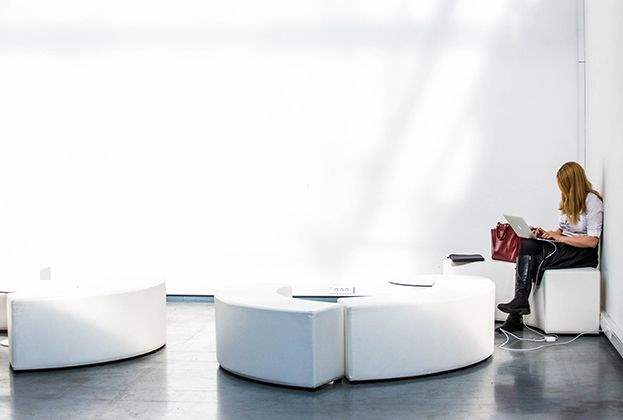The opportunity offered to universities by the rise of the sharing economy is considerable
The phrase ‘sharing economy’ is a relatively new one, and also a highly inaccurate one. Lots of excitable articles will tell you that AirBnB is the world’s biggest hotel operator yet owns no property, or that Uber is the biggest taxi company yet owns no cars – however, what neither company is doing is sharing. They are merely enabling people to pay a rent for a product or service, which is hardly a new concept!
The competition to come up with the next big idea for the sharing economy has led people to think about traditional real estate challenges with a more open mind. For example, virtually every office utilisation study that has been done in the last 30 years has concluded that around 40% of the desks in any office are unused for much of the working day. This is a huge waste of resource and recognition of that has led to the rise of themes such as hot-desking and agile working. More recently, however, we have seen the rise of Workspace as a Service (WaaS) and co-working.
The biggest name in this space at the moment is WeWork, who have acquired 3.5m sq ft of office space just in London since 2013. Indeed, the sector as a whole now occupies 20m sq ft of office space across central London, which is nearly 8% of the total stock.
4.5m sq ft of office space was leased to flexible office providers in the UK in 2017/18
Savills Research
What WeWork and their peers offer is the ability to occupy space for a short period, anything from a month upwards, and to adjust the amount of space you need on a more regular basis than a more traditional commercial property lease. This means that not only do businesses not end up having excess space, but also that they can expand much more quickly and easily than they might have been able to in the past.
As the concept of WaaS has developed, and competition amongst providers has intensified, we have seen the type of offer and services that are on offer broaden. WeWork is experimenting not only with co-living, but also the provision of educational facilities on site. Convene’s offer is based much more around education and knowledge-sharing, with conference and seminar facilities at the heart of their offer. We have also seen other WaaS operators edge towards delivering more technical space, whether they be for 3d printing or for laboratories.
The advantage for the occupiers or customers of these facilities are not just about the flexibility of lease, but also about community and shared services. Whether the services are included as part of the membership fee, or paid for on a draw-down basis they mean that smaller businesses now have access to the facilities that historically you might only have had if you worked for a major bank or technology company. These services can include IT support, food & beverage, conference facilities, healthcare & insurance, access to expensive hardware, and education.
While the phrase ‘sharing economy’ is a little disingenuous, the trend that it describes is gathering pace globally and we expect that the majority of commercial property spaces will be occupied this way in the future. Not only does the concept of leasing your workspace only when you need it fit the way that people and companies increasingly want to work, it also will create new income streams for owners of under-utilised real-estate.
Implications for higher education
The first and most obvious implication of these trends for universities is that short term real-estate requirements need now not involve a long term lease. If you need some office, storage or seminar space for a limited period then maybe there will be a provider in your city who will rent it to you for that period fully-serviced.
However, we believe that the biggest opportunity for universities around the rise of WaaS is monetising under-utilised space. This sector has evolved to satisfy the corporate real estate manager who looks out across their unused desks for which they are paying rent and shakes their head. The same opportunity must be true for the Director of Estates who looks at their student accommodation, lecture and seminar rooms, and laboratories both in term and vacation time.
It is now much easier to match providers and customers, though no platform has yet emerged to do the same thing for education-related space
Savills Research
So, what’s new you ask? Universities have always rented out bedrooms and lecture halls to the conference and convention market in vacations for example. The main change of the last few years however has been the rise of the intermediary application such as AirBnB, Uber or Workthere. It is now much easier to match providers and customers, though no platform has yet emerged to do the same thing for education-related space.
The other major change ties into both this and our first trend on mixing of uses and amenities. Users of space are increasingly demanding more from their “landlord” and the environment in which they work. Whether it is wellness-enhancing spaces such as playing fields and sports halls, medical support, or learning opportunities, we believe that universities which already have many of these facilities are becoming a more attractive workplace than those that don’t.
Indeed, there are aspects of many university’s real estate portfolios that are virtually unique and unlikely ever to be competed for.
While student and staff safety and security is, and always should be, the first concern of any university considering sharing or renting its facilities, we believe that the potential opportunity offered by the rise of the sharing economy is considerable. The benefits to the institution need not only be financial, and may be as simple as improving community engagement or strengthening links with business. The first and most obvious question for any Finance Director or Director of Estates might be “do I have any space that I can rent out on a short term basis”, but the bigger and more interesting question for the future is probably around how important a role the institution could play in satisfying a rising consumer need for experiences, health and well-being.
Read the other articles within this publication below
.jpg)


.jpg)
